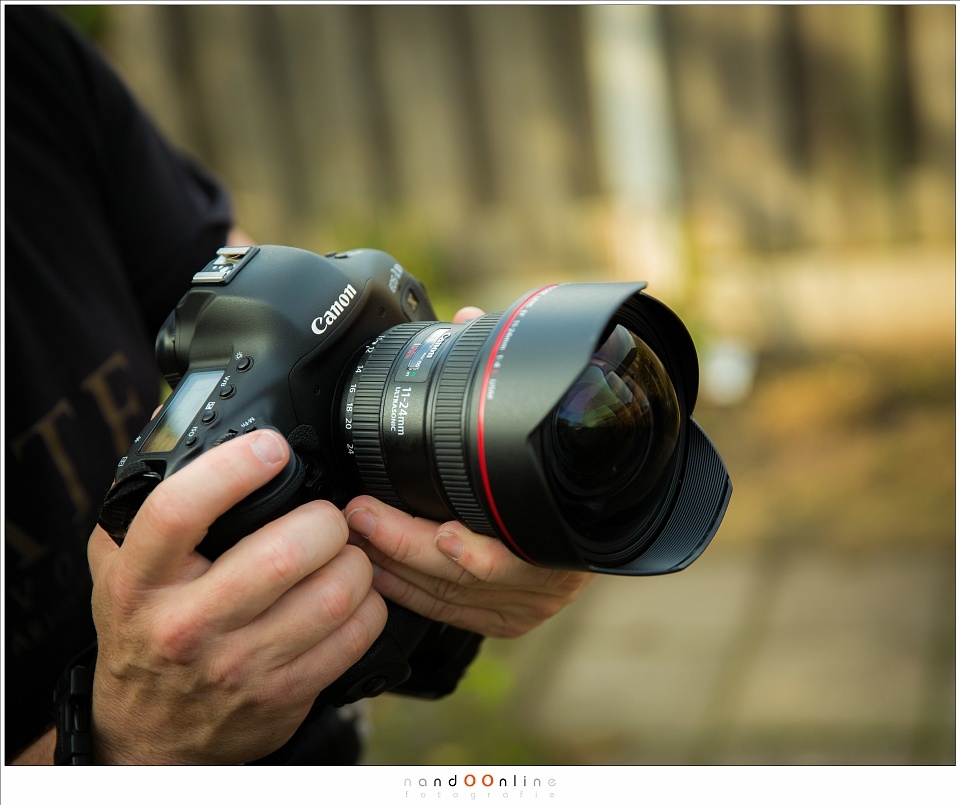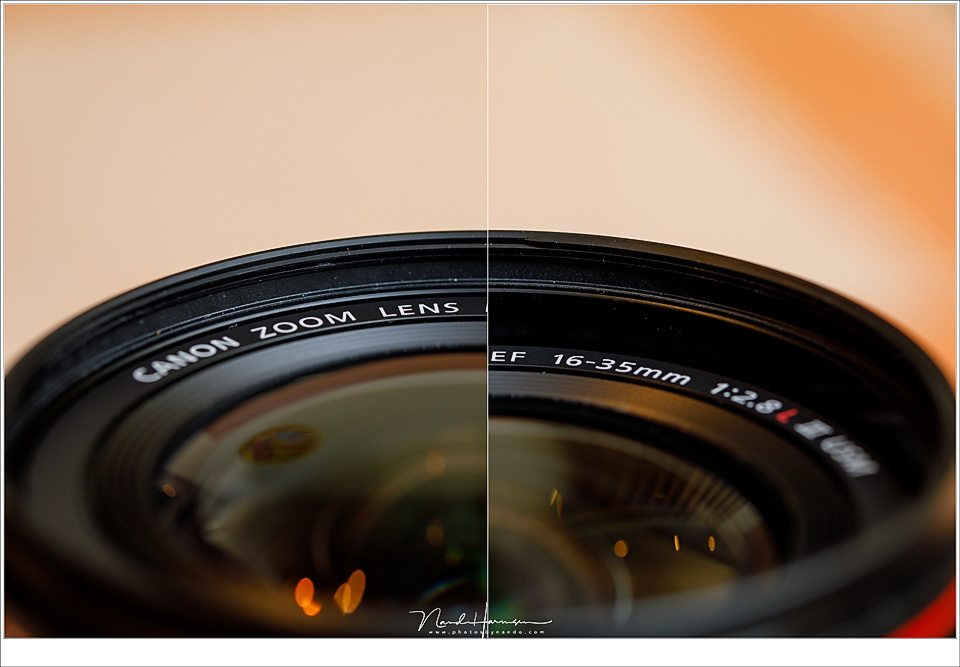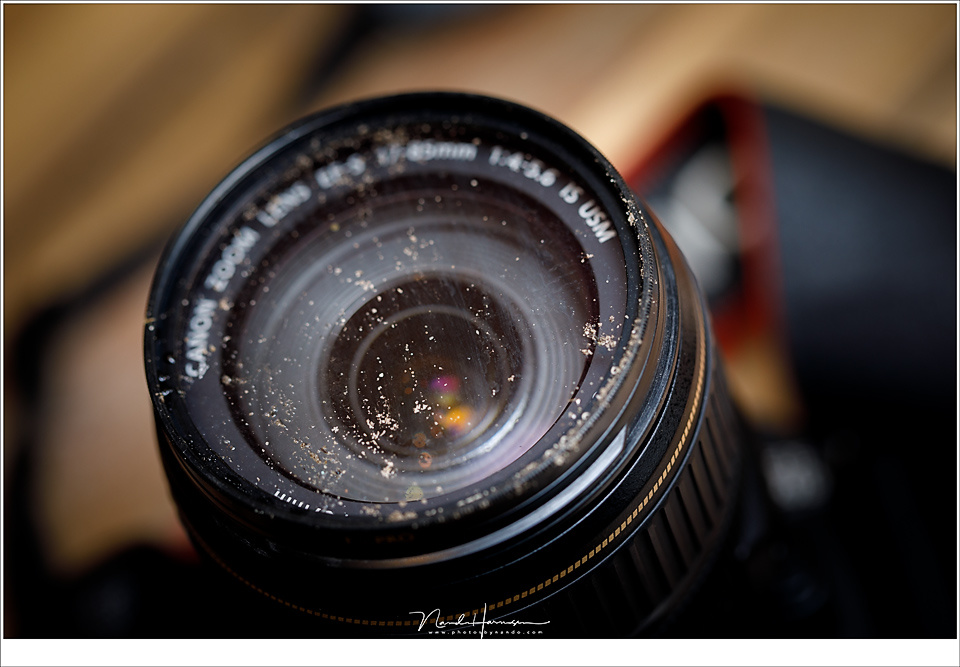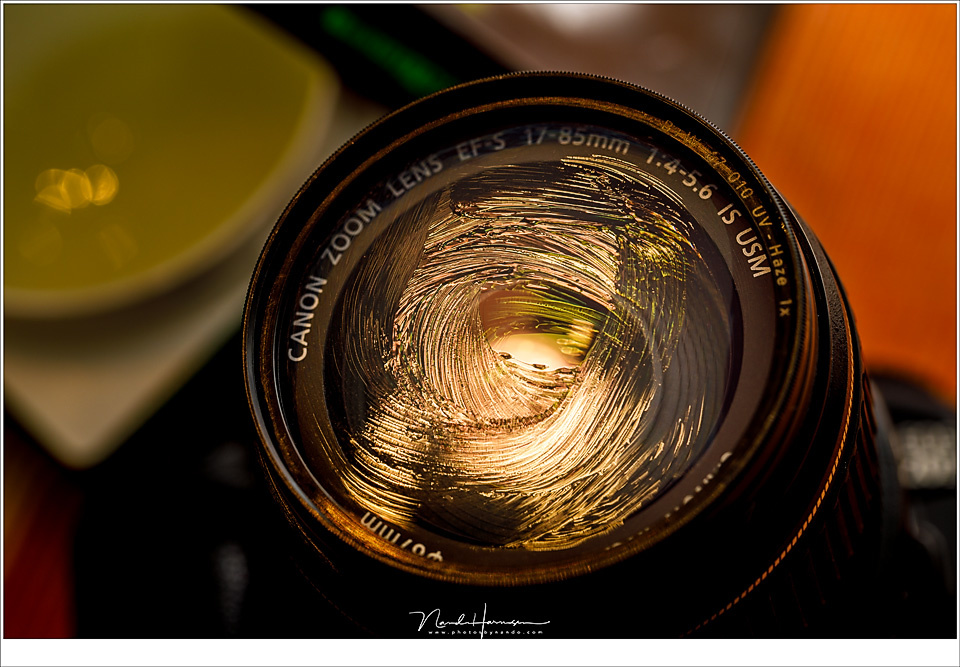Whenever I bought a new lens, I always added a UV filter to it. It was obvious to do so, and I never gave it any thought. But there was a moment that I stopped adding that sort of filter and I never looked back since. Does a UV filter still have any benefit, or is it a waste of money? Let’s find out.
You probably have heard about UV filters, also called Skylight filters (I never understood the exact difference between the two). These pieces of glass, screwed in front of a lens, reduced the amount of ultraviolet light which often resulted in better colors. This was many years ago before front lens elements became coated with all sorts of layers, thus rendering the UV filters useless.

A couple of modern UV filters, specially made for autofocus lenses. Do these filters have any use, or are they relics from the beginning of photography?
These UV filters had a second task. It would protect the front lens element, preventing scratches or bursts in the precious glass. It was easier to replace a broken UV filter than a broken front lens element. Not to mention the costs involved. And it still counts, perhaps even more because lenses are almost 10 times more expensive than 20 or 30 years ago. Another benefit was protection against rain, dust, and sand. Just remove the filter and rinse it. You wouldn't want to do that with your expensive lens.
Today there is no need for filtering ultraviolet light with a UV filter anymore since the lenses have much better coatings. These coatings not only increase performance, it makes the glass very hard and resistant to scratches — up to a certain point of course. The new nano-coated lenses even have water resistance, as if drops don’t like to touch the surface anymore.

It is possible to add water-resistant coatings on front lens elements, like this Laowa 12mm zero-D lens. Water does not stick onto the lens and if it does, you can blow it of without leaving a trace. It is really amazing.
There are also a lot of lenses that won’t accept any filter. The rounded glass of an ultra-wide angle lens prevent any standard filter and rely on the hardened glass to give the protection it needs. As long as you don’t drop your lens, and use a proper lens hood if available, special protection filters are not really needed anymore.

Some lenses do not accept any filter, like this huge Canon EF 11-24mm I reviewed a few years ago.
But I can image you would feel better with a filter installed if possible. It still is an extra protective barrier. That is the only remaining reason for such a filter and that is why many filters are now called protection filters. But this extra glass can turn against you, so be aware. For example, I once jumped over a ditch and fell. My Canon EF 24-70mm f/2.8L lens hit a stone and I ended up with a dent in the filter threat. This small accident made it impossible to place a filter or filter holder.
Imagine what could have happened if I had a UV filter or protection filter installed. In that case the filter itself would have taken the hit, and I am sure it would have bended, just like the filter threat did in my case. Perhaps it would have become impossible to loosen the filter ring due to the damaged filter threat, and I am convinced the filter would have been shattered, with the risk of scratches on the front glass element by sharp broken glass pieces.

When using system filters it is advisable to remove a UV filter. Especially on wide-angle lenses, that extra filter between lens and filter holder can result in a vignette.
From this unfortunately incident I learned that a filter won’t always give the protection you would like to have. And in my case I believe there would have been even more damage when a filter was installed, rendering the lens useless.
There are more situations where I find a filter unwanted. Most of the times a protective filter is significantly less in quality than your expensive lens with its high-quality coatings. Often that small piece of glass increases the risk of flares. Especially when shooting sunrises or sunsets, flare can arise more easily with a filter. But also street lights at night can increase the amount of flaring when a filter is placed. In the worst-case scenario it even can counteract for all the anti-flare coatings of an expensive lens. Think of it this way: why would you put a $30 filter in front of a $2,000 lens? It is like the weakest link in a chain.

Flaring occurs in certain situations. The amount of flare depends on the quality of the lens. No matter how flare resistant a lens is, a simple UV filter can counteract it completely.
There is another drawback to filters. When you like photographing for an extended amount of time at night, like star trails, condensation can occur much sooner with a filter in front of the lens. Condensation originates when the temperature of your lens drops below the dew point. Since a lens has a lot of mass, it takes a while before it is cooled down. But a small filter will cool down a lot quicker. I have seen condensation occur on a lens with a filter within five minutes, while the lens of another camera next to it could continue to shoot without filter for three quarters of an hour before it was cold enough for condense to form. I made the time-lapse below to show how condensation can form while shooting images for a star trail.
Should you completely avoid using protective filters or UV filters? Perhaps not. Some lenses are only water resistant when a filter is placed. Especially those lenses that move inside the barrel when focusing require a filter to protect it from water. But it can also protect your precious lens when photographing on the beach with strong wind. The grains of sand have the tendency to sand blast the front glass element, making a matte glass out of it, rendering the lens completely useless. And of course it is much easier to clean when it gets dirty, just by removing the filter.

A lot of modern lenses have weather sealing. But some lenses require a filter of some sort to protect the lens barrel against water. This also applies for this Canon EF 16-35mm f/2,8L III lens.

If you end up with such a dirty filter, just remove it and rinse it. You wouldn't want to do that with the lens itself. For these situations a UV filter has its benefit.
There is another good use for a UV filter. You can use it for making a DIY soft focus filter. Put a bit of wax, gel, or Vaseline on it and you’re done. Just try it out.

Being creative, making a soft focus lens by applying some Vaseline to the filter.
So don’t throw away your filter yet, but keep it at hand for occasions when you can have benefit from it. Just remove it when it is not necessary.
Do you have a filter on your lenses, and is there a special reason for it? Please let me know below in the comments.
If you're passionate about taking your photography to the next level but aren't sure where to dive in, check out the Well-Rounded Photographer tutorial where you can learn eight different genres of photography in one place. If you purchase it now, or any of our other tutorials, you can save a 15% by using "ARTICLE" at checkout.







You should be more careful if your filter saved your lens so many times. ;)
But I don't want to convince you. I just want to point out how a filter can influence your image under certain conditions. If you want to use them, you must do so.
Well I'm convinced, I've removed my UV filters.
What am I doing wrong? The main reason I have UV filters on my lenses are dust. I understand the lens coatings are supposed to be smudge and dust resistant, but I find the UV filters (Hoya HD) to be much more resistant than my canon lenses by themselves. Am I imagining this, because I don't really see anyone with similar comments.
"I find the UV filters (Hoya HD) to be much more resistant than my canon lenses by themselves"
How can you tell when you use filters? Is it just a feeling or have you tested the difference?
Nothing scientific. But I perceived a big difference on my Canon 16-35mm L III. I had a UV filter on it and dropped my camera, lens and all. Shattered the filter and it took me a while to get the remnants off and order a new one. During that time, I felt like I had to wipe the lens off every time I took the lens cap off to shoot. I am just a hobby photographer and shoot mostly when I travel. I like capturing the sky a lot, so it is easy to spot dust on the lens and have made a habit of checking my first shot. I have spent way too much time trying to remove spots in lightroom!
I woinder... dust on your filter, or on the lens itself.. if it's there, it's there, regardless if you have a filter or not...
I understand. There is going to be dust, lint ect, but I feel that the lens attracts more. Meaning, it seems that the lens has more of a static effect, and that the filter seems to be more dust resistant. ?
I never experienced that. I never use filters, and I never have any problems with dust etc.
I will always use a quality filter on my lenses. First it protects the lens from dirt, sand, grime and my fingerprints. We were taught 30 years ago to never touch a lens glass or a mirror if you can help it. It’s safer to clean a filter than a lens. I have lenses that have never been wiped. I just blow off the dust. But the ultimate test was when I used a cheap tripod with my Mamyia RB 67 camera ( a very heavy camera) in the 1980s. The tripod head broke off when I had it tilted forward. The camera and the 90mm lens hit face down on the concrete. When I picked it up, the filter was cracked like a cob web. My heart was in my throat. I tried to unscrew the filter and it wouldn’t budge. I had a pair of wide gap pliers and I turned steady but slow and it came off. The lens glass was untouched with no damage. The filter ring had no apparent damage. I took a cloth and wiped it down and then ran my fingers around it and it was smooth. I threw the damaged filter in the trash, and went into my camera bag and found another one and put it on. I went out and purchased a bogen 3030 tripod which I used for the next 25 years until I bought my RRS. I will never be without a filter on all lenses and will always have a quality tripod.
I wouldn't surprise me of your lens did not have a scratch even without a filter. But if you feel safe with a filter, of course keep on using them. A safe feeling means the world :)
It's funny you wrote this because I just uploaded a video testing the difference between three differently priced UV filters. What do you think?
https://youtu.be/Rf-z4oOLV0I
I think you should have used the filters also under more challenging light situations.
If you are worried about condensation on the front of the UV filter, your lens is too cold. It has much more mass and as you adjust the focusing or zoom, the lens will breathe in that moisture. I am much more worried about that than moisture on the front element or filter which can be wiped off..
If a $30 filter on a $2,000 lens bothers you, what kind of wipers are you putting on your $35,000 car? If you are really worried about the quality, do a test with and w/o the filter. Try some pixel peeping and check how much difference there is. Make it fun and have a friend take the shots and you guess which had the filter.
I use a UV filter on an old lens I have. The coating appears inconsistent so I use it for piece of mind. If using a filter gives you peace of mind, go for it. If you can live without the filter, then don't.
If you feel more confidence with a filter installed, that is enough reason to use it. It wouldn't be good if you only worry about your lens if it hasn't got a filter.
Just be aware of the side effect you can encounter.